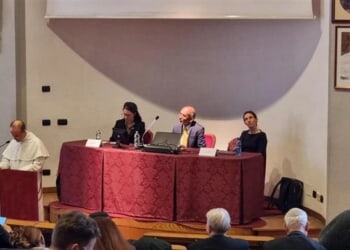One of our leading opera singers gave a recital in Carnegie Hall on Friday night. She is Nina Stemme, the Swedish soprano. Soprano, yes. But in her recital, she often sounded like a mezzo. Even a contralto.
I thought of Jessye Norman. Was she a soprano? A mezzo-soprano? A contralto? The answer, in a way, is yes (though she was categorized as a soprano, and rightly so, I think).
Ms. Stemme has sung a variety of roles, but is especially known for ones that require heft and stamina. Three of her roles at the Metropolitan Opera have been Turandot, Isolde, and Elektra.
She was accompanied on Friday night by Roland Pöntinen, a Swedish pianist, who had some of his education at America’s own Indiana University. He is a fine and versatile pianist.
His name looks Finnish, does it not? (Maybe short one “n.”) There is cross-pollination in the North, as everywhere else.
Stemme and Pöntinen began with English songs—in particular, the Sea Pictures of Elgar. Beforehand, I had an admonition for myself: “Get Baker and Barbirolli out of your head, Jay.” (Dame Janet Baker and Sir John Barbirolli made a famous recording—well-nigh definitive—of the Sea Pictures in 1965.)
That Stemme sang these songs competently and impressively goes without saying. Yet she did not seem fully at home in them on Friday night. She was at times stiff or stentorian. The songs could have used more of a flow (in consonance with the sea).
In the next songs, she was very much at home. These were songs of Kurt Weill, four of them, two in German, two in French. Stemme showed herself to be a real woman of the musical theater.
One of the songs was “Youkali”—which Angel Blue, the American soprano, sang on that same stage two months ago (with Lang Lang at the piano). “Youkali” has been sung at Carnegie Hall only a handful of times since it was composed in 1934. What were the odds that it would be sung twice there in two months?
After intermission, Ms. Stemme came out in a new gown to sing some Isolde—some Isolde and some pre-Isolde. What could I mean? Stemme began the second half by singing Wagner’s Wesendonck Lieder, those five songs that prefigure Isolde, or serve as studies for her.
They are sublime songs, and Stemme sang them sublimely: with richness, nuance, understanding, soul. Mr. Pöntinen was an able partner (as all through). In “Träume,” the final song, he was somewhat free with rhythm but never stalled momentum. And he made pure, beautiful sounds.
The printed program ended with the Liebestod, the aria (or set piece) that concludes Tristan und Isolde. Our program listed the piece unusually. The composer: “FRANZ LISZT.” The composition: “Liebestod from Tristan und Isolde (arranged for voice and piano after Richard Wagner).”
Okay. I myself would have gone with “RICHARD WAGNER, ARR. FRANZ LISZT” or something like that. In any event . . .
When Stemme started singing, so did the woman behind me. Fortunately, she stopped soon (the audience member, not Stemme). She resumed after a while—but again stopped soon, which was merciful.
The Liebestod can be sung coolly—with a detached, otherworldly feeling. Ms. Stemme was rather emotional and this-worldly. Her final note was a bit south of center. But Stemme singing Isolde is a treat.
There were two more to come. Stemme had done no talking during the recital—another mercy—but she spoke at encore time, as is traditional and welcome. She said that she and Mr. Pöntinen wanted to offer something “from our region.”
The song was by Sibelius, “Was It a Dream?” (as we know the song in English). It was so beautiful—romantic, of course, but also dignified. They are dignified, this singer and this pianist.
She then announced that she would sing “My Ship.” So, that made a fifth Weill song (this one in English). I remember another Swedish singer, Anne Sofie von Otter, singing it as an encore in Carnegie Hall, twenty years ago.
Question: Is “My Ship” happy or sad? The answer, I think, is yes. The words are happy enough. But there is a melancholy in the music. The song always makes me sad, honestly.
But I am never sad to hear Nina Stemme, an outstanding singer, and an exponent of civilization.
















